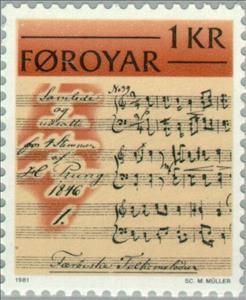Stamp: Historical documents, musical notes (1846) (Faroe Islands 1981)
Historical documents, musical notes (1846) (Faroe Islands 1981)
19 October (Faroe Islands ) within release Theme goes into circulation Stamp Historical documents, musical notes (1846) face value 1 Faroese króna
| Stamp Historical documents, musical notes (1846) in catalogues | |
|---|---|
| Michel: | Mi:FO 66 |
Stamp is vertical format.
Also in the issue Theme:
- Stamp - Historical documents, musical notes (1846) face value 1;
- Stamp - Historical documents, book page (1298) face value 3;
- Stamp - Historical documents, seal (1533) face value 6;
- Stamp - Historical documents, book title (1673) and library face value 10;
Stamp Historical documents, musical notes (1846) it reflects the thematic directions:
Music is an art form and cultural activity whose medium is sound organized in time. The common elements of music are pitch (which governs melody and harmony), rhythm (and its associated concepts tempo, meter, and articulation), dynamics (loudness and softness), and the sonic qualities of timbre and texture (which are sometimes termed the "color" of a musical sound). Different styles or types of music may emphasize, de-emphasize or omit some of these elements. Music is performed with a vast range of instruments and vocal techniques ranging from singing to rapping; there are solely instrumental pieces, solely vocal pieces (such as songs without instrumental accompaniment) and pieces that combine singing and instruments. The word derives from Greek μουσική (mousike; "art of the Muses"). In its most general form, the activities describing music as an art form or cultural activity include the creation of works of music (songs, tunes, symphonies, and so on), the criticism of music, the study of the history of music, and the aesthetic examination of music. Ancient Greek and Indian philosophers defined music as tones ordered horizontally as melodies and vertically as harmonies. Common sayings such as "the harmony of the spheres" and "it is music to my ears" point to the notion that music is often ordered and pleasant to listen to.
A document is a written, drawn, presented, or memorialized representation of thought, often the manifestation of non-fictional, as well as fictional, content. The word originates from the Latin Documentum, which denotes a "teaching" or "lesson":
An anniversary is the date on which an event took place or an institution was founded in a previous year, and may also refer to the commemoration or celebration of that event. For example, the first event is the initial occurrence or, if planned, the inaugural of the event. One year later would be the first anniversary of that event. The word was first used for Catholic feasts to commemorate saints. Most countries celebrate national anniversaries, typically called national days. These could be the date of independence of the nation or the adoption of a new constitution or form of government. The important dates in a sitting monarch's reign may also be commemorated, an event often referred to as a "Jubilee".



